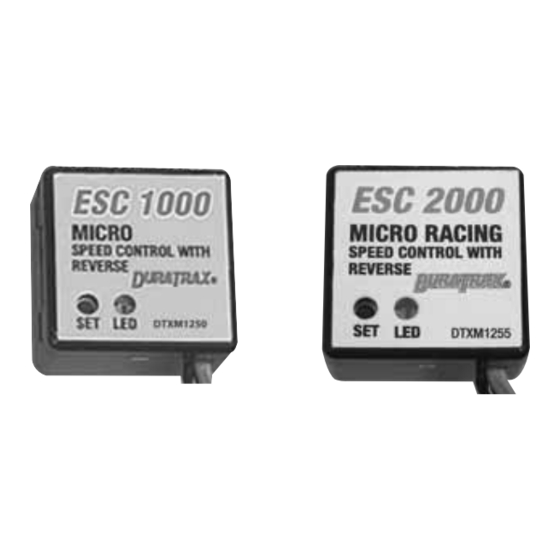
Advertisement
Quick Links
®
ELECTRONIC SPEED CONTROL
OPERATING INSTRUCTIONS
INTRODUCTION TO
ESC 1000/ESC 2000 INSTRUCTIONS
The following instructions will help you get trouble-free operation from
your electronic speed control (ESC). These simple steps will allow your
ESC to achieve maximum performance and minimize the chance of
problems due to incorrect installation. Consult the specifications listed
below for limitations for this ESC. You should always ask your hobby
dealer or call our service department before using the ESC for an
application other than what is listed in these instructions. PLEASE
FOLLOW ALL INSTRUCTIONS CAREFULLY!
Features & Specifications
•
The ESC 1000 ESC is designed to be used with up to 10A peak motors.
•
The ESC 2000 ESC is designed to be used with up to 20A peak motors.
•
Motor, battery, and radio connectors are pre-installed.
•
High frequency operation provides very smooth control, maximizes
battery run time, and reduces operating temperatures.
•
Led indicators (non-setup) are red and green (neutral), red for
reverse, and green for forward throttle.
Specifications
ESC 1000
Input Power:
Operating Frequency:
BEC:
Current Rating Forward:
Current Rating Reverse:
Case Size (with heat sink):
Weight (with heat sink):
ESC 2000
Input Power:
Operating Frequency:
BEC:
Current Rating Forward:
Current Rating Reverse:
Case Size (with heat sink):
Weight (with heat sink):
IMPORTANT PRECAUTIONS
(ESC=ELECTRONIC SPEED CONTROL)
•
Do not run the car near water! Never allow water, moisture, or any
foreign material inside the case of the ESC.
•
Never use more than 6 cells (7.2 volts total) in the battery pack.
•
Do not attempt to connect the battery pack to the ESC in reverse,
as permanent damage to the ESC could result.
•
Do not mix instructions. If you are building a vehicle that has a
mechanical speed control, do not use the wiring diagram included
with the vehicle.
•
Never cut or splice the ESC input wires. Do not connect a battery
to the receiver's (Rx) "battery" slot. The Rx receives power through
the ESC itself which plugs into the Rx's throttle channel slot.
•
Always disconnect the battery pack from the ESC when not in use.
•
Never turn on the ESC before plugging it into the Rx and switching
on the transmitter (Tx).
STEP 1
MOUNTING THE SPEED CONTROL
The following information can help the ESC perform at maximum
efficiency and minimize the chance of overheating and radio
interference problems.
MOUNTING THE SPEED CONTROL (Figure 1)
1.
Locate the ESC in a position to allow for good airflow, with as little
obstruction from the model's outer body or exterior dirt and debris
as possible. Maintaining a clean ESC and achieving good airflow
across the unit is very important for keeping the ESC cool and
maximizing performance.
2.
Mount the ESC using double-sided mounting tape.
3.
Mount the ON/OFF switch in a convenient place. Ensure that it is
securely mounted using mounting tape in a location where it
cannot be easily turned off by objects on the track or rough terrain.
4.8 – 7.2 volts DC (4–6 cells)
13.9 kHz
5.0 volts / 1.0 amp
10 amps
4A Reverse voltage protection
1.02" x 1.02" x 0.63" (26 x 26 x 16mm)
0.88 oz (25g)
4.8 – 7.2 volts DC (4–6 cells)
13.9 kHz
5.0 volts / 1.0 amp
20 amps
10A Reverse voltage protection
1.02" x 1.02" x 0.63" (26 x 26 x 16mm)
0.88 oz (25g)
MOUNTING THE RECEIVER
1.
Radio interference can cause the ESC to rapidly switch between
forward and brake, overheating the transistors and possibly
damaging the ESC. The Receiver (Rx) and its antenna should be
mounted as far away from the ESC as possible. Also, try to keep
the Rx away from the motor, battery, power wires, servos, or any
large piece of metal - such as a metal chassis.
2.
Make sure the Rx antenna can be fully extended through an
antenna tube and not completely enclosed inside the model. Do
NOT cut or coil the Rx antenna.
Mount the speed control to obtain
maximum airflow over the ESC.
STEP 2
TRANSMITTER ADJUSTMENTS
Adjusting your transmitter (Tx) is critical for proper speed control
operation. The Tx throttle adjustments are described below:
•
ATV, EPA, or ATL - set all to maximum.
•
Throttle Trims and Sub Trims - set all at neutral or zero.
STEP 3
RADIO CONNECTOR POLARITIES
The connector included on the ESC directly fits Futaba receivers. By
simply clipping off the tab on the side of the connector using wire
cutters, it can be directly connected to any Airtronics "Z," Hitec "S," or
JR receivers. For proper connection refer to your radio's manual.
STEP 4
MOTOR PREPARATION
Your motor will require three .1µF capacitors soldered as shown. These
capacitors will help prevent RF feedback from the motor.
Clip tab
Advertisement

Summary of Contents for Duratrax ESC 1000
- Page 1 FOLLOW ALL INSTRUCTIONS CAREFULLY! Features & Specifications STEP 2 • The ESC 1000 ESC is designed to be used with up to 10A peak motors. • The ESC 2000 ESC is designed to be used with up to 20A peak motors. TRANSMITTER ADJUSTMENTS •...
- Page 2 Problem: ESC runs with switch off. warranty. Unit will require service. See “Service Procedures.” For service to your DuraTrax product, either in or out of warranty, ESC WORKS BUT OTHER PROBLEMS EXIST include a detailed description of the problem, return address and Problem: Rx glitches or stutters during acceleration.





Need help?
Do you have a question about the ESC 1000 and is the answer not in the manual?
Questions and answers